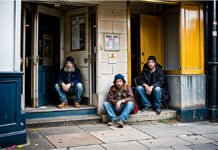London’s rough sleepers to be offered hotel beds to self isolate with an Initial trial of 300 central London rooms made available
“Homeless Londoners will benefit from vital protection against the coronavirus, as Mayor of London Sadiq Khan, with the support of the British government, has secured 300 hotel rooms where they will be able to self-isolate over the next weeks”, the London City Hall announced in a press release.
An operation to bring homeless people to hotel rooms started Friday night and will continue throughout the weekend. The 300 rooms are located in two Intercontinental London hotels and the people will be driven there in London black cabs, to avoid using public transport.
The rooms are booked for the next 12 weeks.
The COVID-19 coronavirus has killed 281 people in the UK, and the number of cases is particularly high in London.
“The coronavirus pandemic is impacting everyone in London and we must do everything we can to protect everyone’s health, especially the Londoners who sleep outside every night”, said London Mayor Sadiq Khan.
“The COVID-19 threatens us all, but it disproportionately affects the most fragile, including the homeless”, said the British Housing minister Robert Jenrick in the same press release.
Sonia Faleiro is a writer based in London and the author of “The Good Girls,” which will be published by Bloomsbury/Grove Atlantic in 2021. writes:
“Homeless people are among those most at risk of contracting the coronavirus. They are also among the most overlooked.”
“The problem is widespread and on the rise in the U.K., where some 320,000 people about 1 in every 200 Brits are homeless, and at least 84,000 households are living in temporary accommodation, according to December 2019 data. A recent study showed that 9 in 10 homes across the U.K. remain unaffordable for people on housing benefits, pushing families into homelessness or emergency shelters.”
Many rough sleepers and homeless people have pre-existing conditions, due to exposure and poor nutrition, making them particularly at risk of having complications if they are infected. They are three times more likely than the average person to have a serious respiratory problem, and their lifespan is already just 45 for men and 43 for women, according to the Office for National Statistics. More than half have mental health problems, says the National Health Service.
Not only are Homeless people more likely to suffer from underlying health problems, including breathing problems, which increases the danger of the virus once caught. It is also more difficult for them to self-isolate and apply social distancing measures, to find shelter and maintain body hygiene, the Housing minister added.
“So on the one hand you’re more likely to get it, to be severely affected by it, even die from it, and on the other you’re also completely unable to follow the guidelines that have been recommended for the general population,” said Matthew Downie, the director of policy and external affairs at Crisis, a national U.K. charity for homelessness.
Because many rough sleepers don’t have regular access to information, many could even be unaware of the epidemic and authorities’ recommendations of how to protect yourself from becoming infected.
Even if they are aware of official advice, following recommendations on social distancing, isolation and hand washing is extremely difficult in many cases. Those who rely on hostels and night shelters often live dormitory style, sharing bathrooms, which increases their chances of catching and transmitting the virus.
In 2018-2019, London counted around 9,000 homeless people.
The cost of the measure has not been announced, but the hotel rooms were booked at “a significantly reduced price”, the London City Hall said.
In the last week, France took similar measures, announcing it would open “self-isolation centres” in empty buildings across the country for the homeless who are sick with the coronavirus but don’t need hospitalisation.

Glasgow City Council recently announced that it is identifying furnished flats as well as self-contained spaces within communal accommodation to be used as spaces where homeless people can self-isolate. Two hotel chains have approached the Crisis charity offering to temporarily open their doors to the homeless, given they have low occupancy rates during the epidemic.
The problem isn’t a lack of housing, it’s a lack of will.
“You don’t want the poorest among us clogging hospital beds because you haven’t been good with your support when they needed it,” he said.
If the government doesn’t act fast, he added, “people will fall ill on the streets and die.”
It comes as the number of UK deaths reached 281, including a person aged 18 with an underlying health condition.
They are thought to be the youngest person with the virus to have died in the UK so far.
The rise of 48 deaths since Saturday includes 37 in England, seven in Wales, three in Scotland and another in Northern Ireland. The number of UK cases also rose to 5,683.
The NHS said all those who died in England in the past day were in vulnerable groups including with underlying health issues.
It comes as the NHS in England has identified 1.5 million of the most at-risk people who should now stay at home for 12 weeks.
The PM told those people to “shield” themselves, adding it “will do more than any other single measure that we are setting out to save life”.
#covid19uk #Coronavirus #COVID-19 #SocialDistancing
Help Us Sustain Ad-Free Journalism
Sorry, I Need To Put Out the Begging Bowl
Independent Journalism Needs You
Our unwavering dedication is to provide you with unbiased news, diverse perspectives, and insightful opinions. We're on a mission to ensure that those in positions of power are held accountable for their actions, but we can't do it alone. Labour Heartlands is primarily funded by me, Paul Knaggs, and by the generous contributions of readers like you. Your donations keep us going and help us uphold the principles of independent journalism. Join us in our quest for truth, transparency, and accountability – donate today and be a part of our mission!
Like everyone else, we're facing challenges, and we need your help to stay online and continue providing crucial journalism. Every contribution, no matter how small, goes a long way in helping us thrive. By becoming one of our donors, you become a vital part of our mission to uncover the truth and uphold the values of democracy.
While we maintain our independence from political affiliations, we stand united against corruption, injustice, and the erosion of free speech, truth, and democracy. We believe in the power of accurate information in a democracy, and we consider facts non-negotiable.
Your support, no matter the amount, can make a significant impact. Together, we can make a difference and continue our journey toward a more informed and just society.
Thank you for supporting Labour Heartlands












